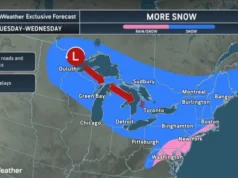
The biggest question facing global energy markets is whether Iran will respond to the U.S. bombing of its nuclear facilities by disrupting the flow of oil and natural gas in the Persian Gulf region.
The economic toll would be steep, including for Iran. That is because a large portion of the world’s oil and liquefied natural gas, or L.N.G., passes through the Strait of Hormuz, a waterway that hugs a portion of Iran’s southern border.
Any attempt to close the strait, which connects the Persian Gulf to the Gulf of Oman, would most likely send oil prices soaring. It would also inflict severe economic damage in Iran because nearly all of the country’s oil exports move through the channel.
The market’s early reaction to the U.S. bombing of three Iranian nuclear sites over the weekend will become clear on Sunday evening, when crude oil futures begin trading at 6 p.m. Eastern time.
U.S. oil prices have climbed around 15 percent in the past two weeks, settling on Friday at $74.93. That is a moderate price by recent standards.
Disclaimer
Artificial Intelligence Disclosure & Legal Disclaimer
AI Content Policy.
To provide our readers with timely and comprehensive coverage, South Florida Reporter uses artificial intelligence (AI) to assist in producing certain articles and visual content.
Articles: AI may be used to assist in research, structural drafting, or data analysis. All AI-assisted text is reviewed and edited by our team to ensure accuracy and adherence to our editorial standards.
Images: Any imagery generated or significantly altered by AI is clearly marked with a disclaimer or watermark to distinguish it from traditional photography or editorial illustrations.
General Disclaimer
The information contained in South Florida Reporter is for general information purposes only.
South Florida Reporter assumes no responsibility for errors or omissions in the contents of the Service. In no event shall South Florida Reporter be liable for any special, direct, indirect, consequential, or incidental damages or any damages whatsoever, whether in an action of contract, negligence or other tort, arising out of or in connection with the use of the Service or the contents of the Service.
The Company reserves the right to make additions, deletions, or modifications to the contents of the Service at any time without prior notice. The Company does not warrant that the Service is free of viruses or other harmful components.












